You may have noticed that in the evangelical world, the ground beneath our feet has been shifting as churches, seminaries, pastors, authors, and Christian leaders are shifting in their views of sexual morality. Bill Clinton, a Democrat President, signed into law the Defense Of Marriage Act back in 1996. That wasn’t very long ago. At that time, only the most radical, extreme progressive Christians would have objected. Now, a mere 26 years later, those of us who uphold traditional marriage as the norm are considered extremists.
This puts pastors and institutional leaders in a predicament: speaking out against the sexual revolution comes with a cost, which is why some choose to remain silent, hoping to weather the storm. But that’s not a viable option. David Gushee was a prominent evangelical leader before famously adopting a pro-homosexuality position in 2016. In an editorial explaining his change, he said something that I wholeheartedly agree with:
“Neutrality is not an option. Neither is polite half-acceptance. Nor is avoiding the subject. Hide as you might, the issue will come and find you.”
As Gushee pointed out, there’s no neutrality on sexuality. There’s no middle ground. Sooner or later, Christian leaders will be forced to affirm the sexual revolution or else. The same is true for the churches and institutions they lead. That’s why I’m convinced that churches and institutions need to do what they can now to fortify their institutions against theological drift into progressivism.
The Four Stages of Institutional Decline
I recently listened to a podcast by Krista Bontrager (“Theology Mom”) that outlined four steps of institutional decline. As a mother, Bontrager has studied Christian schools and colleges for these trends out of concern for the children of her listeners. It’s a simple, helpful resource that can help you identify vulnerabilities in your church or Christian organization and what you can do to prevent this decline. I’ll make a few comments from a church leadership perspective. (Seriously though, listen to the podcast. It’s really good.)
Stage One
Stage 1 is when the church is healthy, strong, and biblical. Leaders and parishioners are on board and aligned, and there’s clarity about the church’s stance and approach towards hot-button cultural issues like abortion, LBGTQ lifestyles, race, and so on.
Stage Two
Stage 2 is when yellow flags appear, because the church is unwilling to be vocal about divisive cultural issues. Churches can easily slip into Stage 2, because being vocal about contentious issues upsets people, and they may leave the church. If key volunteers, leaders, or generous donors leave, there are lots of downstream consequences that pastors would rather avoid. So silence seems best.
But silence on these issues on exacerbates the problem, because there’s no clear guidance on how disagreements are handled in the church. Sexuality is too important for a naive “agree to disagree” approach. If a church is silent about sexuality to avoid upsetting its key tithers, then it’s already in big trouble. The leadership has settled for a veneer of “peace” that can only mask the underlying tensions for a while. As Gushee said, “the issue will come and find you.”
Bontrager points out that the silence of Stage 2 is usually caused by internal leadership division that hasn’t spilled out into public view yet. The pressure applied by a progressive leader on the staff or board can be just enough to keep the organization quiet on matters to keep the peace.
It is difficult for Stage 2 churches to recover. Turning things around require hard, painful decisions that few leaders are willing to make.
Stage Three
Stage 3 churches are already significantly compromised. Internally, key leadership positions are controlled by progressives, though outwardly the church may still signal its faithfulness to historic Christianity.
Outwardly, churches like this can subscribe to historical creeds and confessions, such as the Westminster Confession of Faith. They may claim to uphold conservative biblical doctrines of biblical inerrancy and traditional marriage. The leadership says, “we believe in traditional marriage! We uphold the sanctity of human life! We believe in biblical authority!”
These overtures are sufficient to keep their conservative congregants naively hopeful that there’s no trouble brewing behind closed doors. Meanwhile, due in part to a lack of clear teaching on these issues, once faithful congregants slowly drift in a progressive direction under cultural pressure, while new progressive members fill their ranks, shifting the ideological balance of power away from orthodoxy.
Stage Three churches rarely, if ever, recover.
Stage Four
Stage four is terminal. The ideological coup is complete. There is no longer any need to keep up the charade. The Stage Four church has been completely captured by the world and there’s no turning it around. The Spirit has departed. This church may continue to meet every week, collect money, sing songs, and listen to messages, but it’s not Jesus they’re worshiping. They have become synagogues of Satan, where the prophets of Ba’al proclaim their false gospel from once faithful pulpits.
Don’t think this is a rare, fluke phenomena. All the mainline denominations that are now celebrating LGBTQ lifestyles once represented faithful Christianity. They may have taken decades to fall apart, but they did indeed fall.
This is why the scriptures warn over and over about maintaining faithfulness to true, Christian doctrine:
“Wage the good warfare” (1 Tim 1:18).
“Command and teach these things” (1 Tim 4:11).
“Devote yourself to the public reading of Scripture, to exhortation, to teaching” (1 Tim 4:13).
“Keep a close watch on yourself and on the teaching. Persist in this, for by so doing you will save both yourself and your hearers” (1 Tim 4:16).
“Command these things as well, so that they may be without reproach” (1 Tim 5:7).
“Teach and urge these things,” referring to various instructions pertaining to different people in the church (1 Tim 6:2).
“Fight the good faith of the faith” (1 Tim 6:12).
“I charge you in the presence of God… to keep the commandment unstained and free from reproach until the appearing of our Lord Jesus Christ” (1 Tim 6:13-14).
“Guard the good deposit” of the gospel (1 Tim 6:20, 2 Tim 1:14).
“Preach the word; be ready in season and out of season; reprove, rebuke, and exhort, with complete patience and teaching” (2 Tim 4:2).
“I have fought the good fight, I have finished the race, I have kept the faith. Henceforth there is laid up for me the crown of righteousness” (2 Tim 4:7-8).
“For there are many who are insubordinate, empty talkers and deceivers, especially those of the circumcision party. They must be silenced, since they are upsetting whole families by teaching for shameful gain what they ought not to teach” (Titus 1:10-11).
“Therefore rebuke them sharply, that they may be sound in the faith, not devoting themselves to Jewish myths and the commands of people who turn away from the truth” (Titus 1:13-14).
“But as for you, teach what accords with sound doctrine” (Titus 2:1).
“Declare these things; exhort and rebuke with all authority. Let no one disregard you” (Titus 2:15).
I’ve met many faithful pastors in the past couple of years who recognized their churches were in Stage Two and took immediate action. I wish I could say they all turned their churches around, but that’s just not true. All of these men kept their integrity, though not all of them kept their jobs. The Lord will reward them for their faithfulness.
If you find yourself in the middle of a church on this decline, I’d love to hear from you and pray for you. The modern church is going through a time of testing, and this is when faithful churches and faithful pastors rise to the challenge and lead with courage.
Stay strong, my friends.
God’s Good Design in the Wild
There are a couple of published book reviews of God’s Good Design in the works (including a review in Eikon, the journal for the Council on Biblical Manhood and Womanhood), and I’m going to be appearing on a few more podcasts in the coming weeks. I’ll keep you posted.
Here’s a couple of reviews I saw on Goodreads. I’m eager to read more reviews.I expect some good-faith reviewers will have helpful critiques that can sharpen my own thinking.
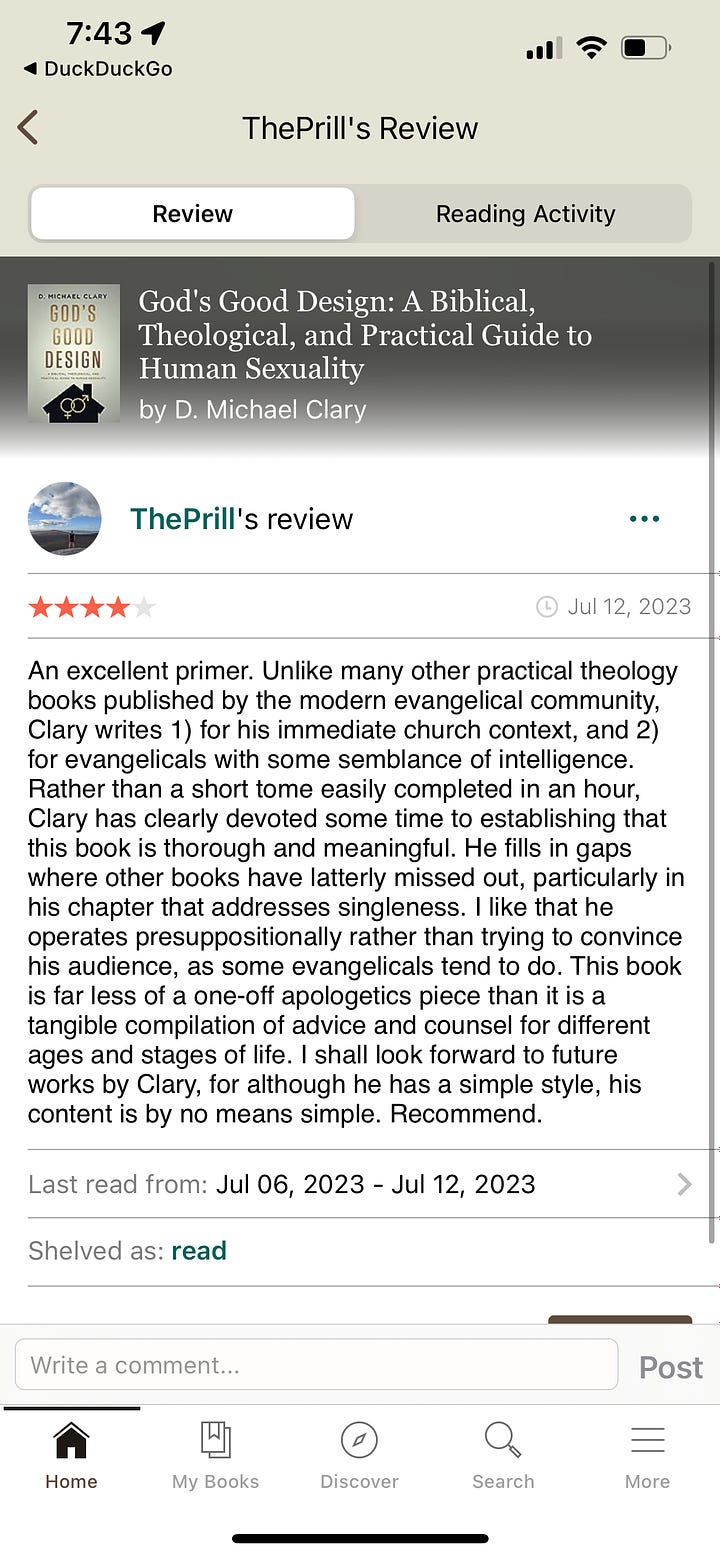
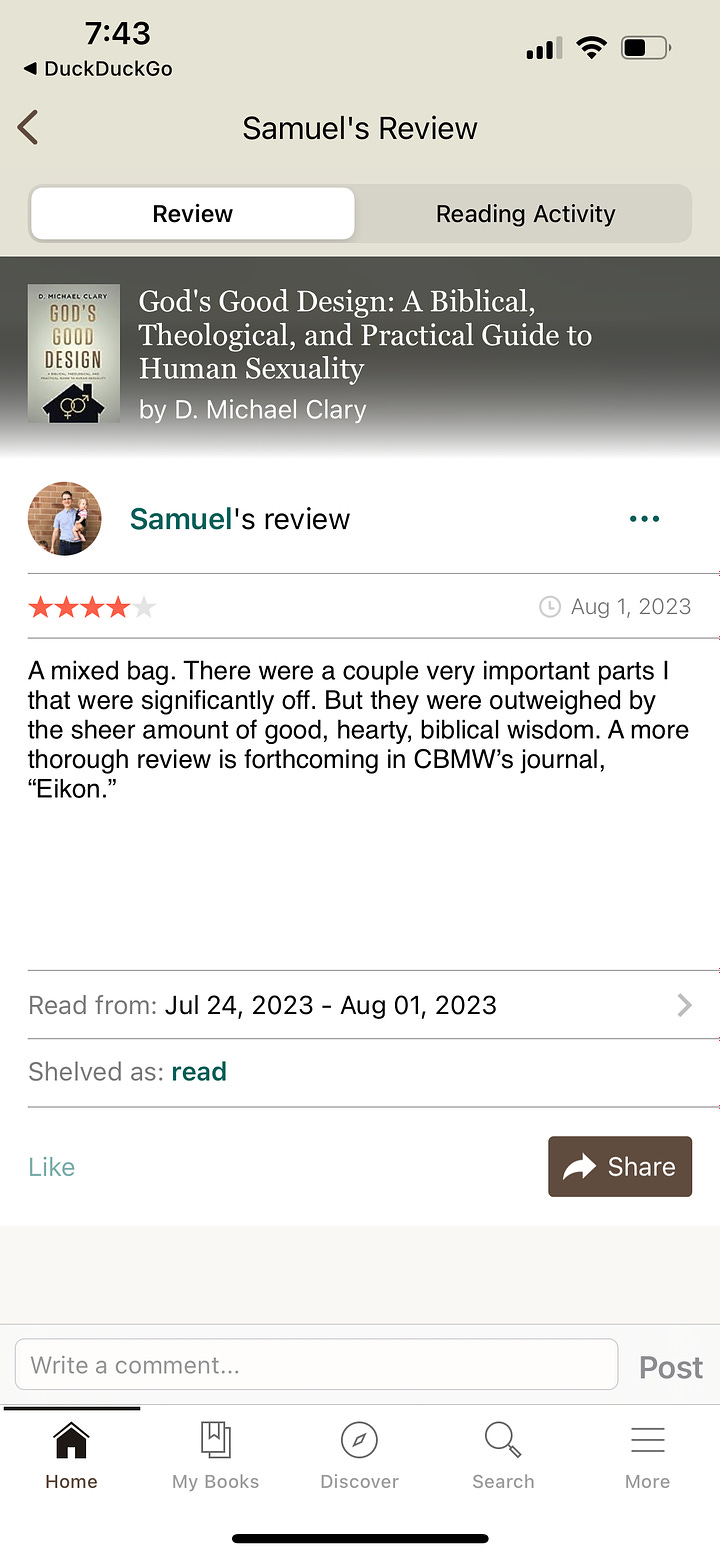
I wrote GGD as a resource for the church, and it’s a huge encouragement to see people out on the internet recommending the book because it was helpful to them.
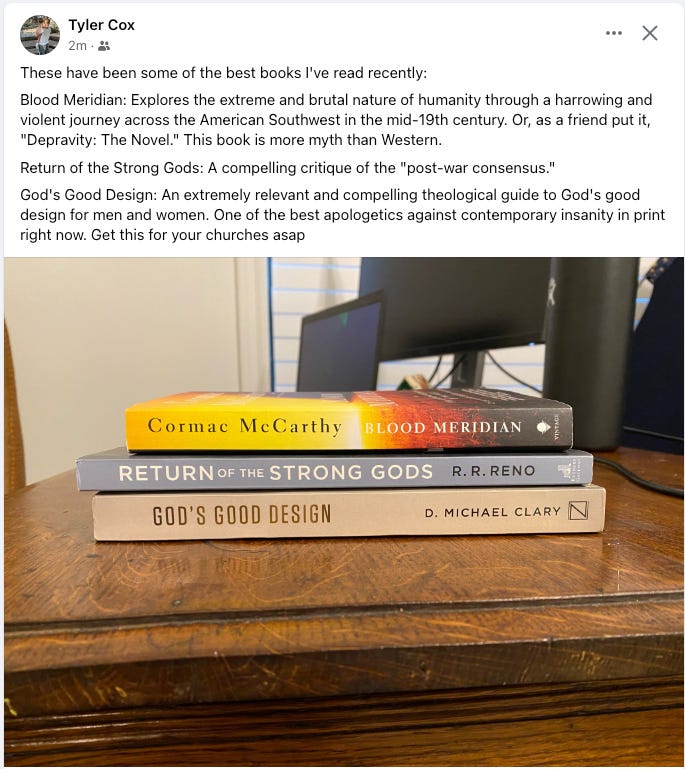
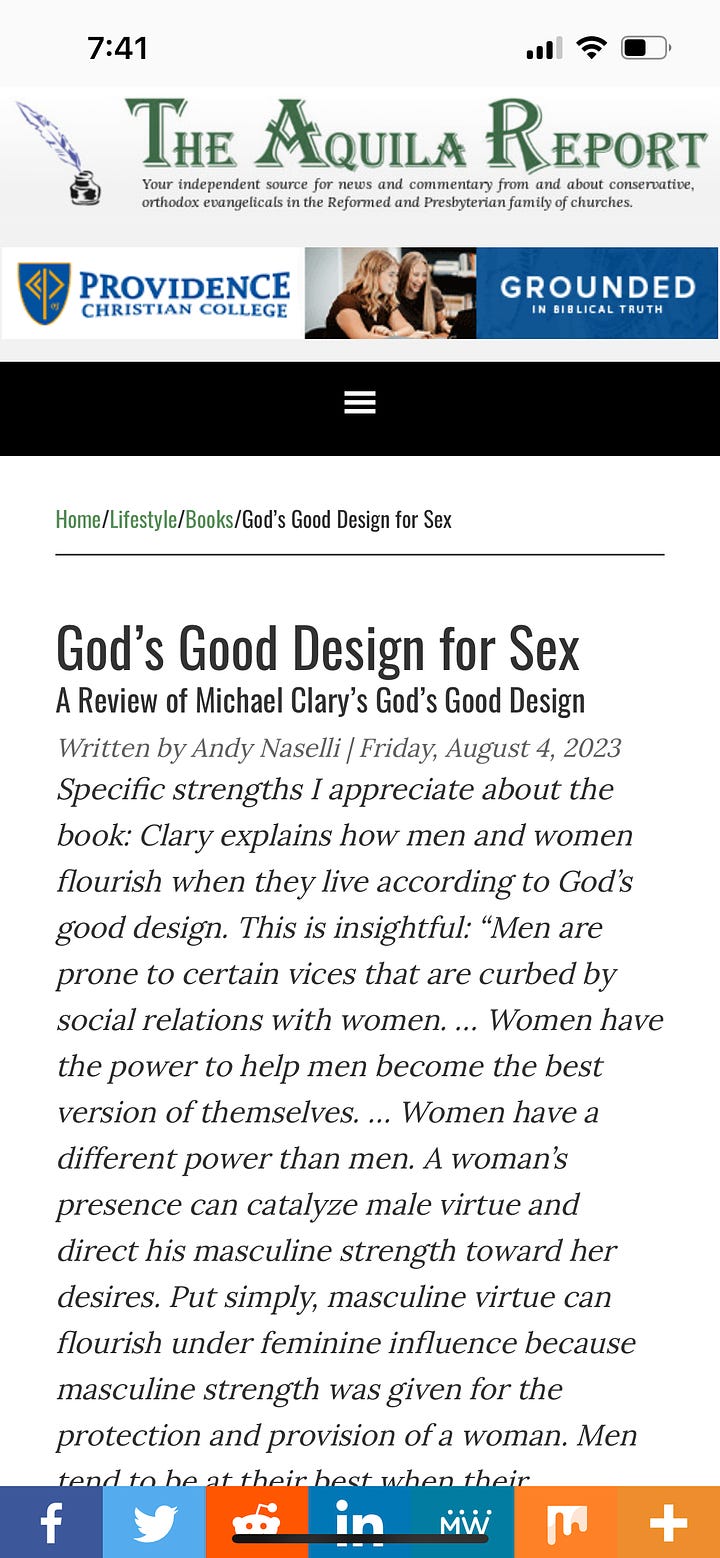

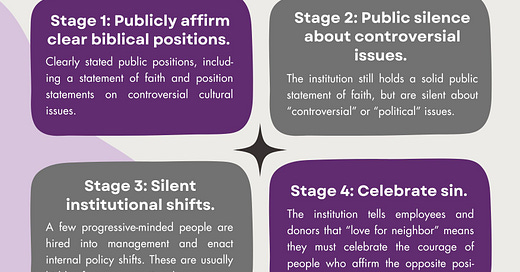


Thanks for sharing this! A friend just forwarded this to me... I just subscribed and shared it to Notes. It is so profoundly disappointing to see these stage 3 and 4 churches increasing in number.